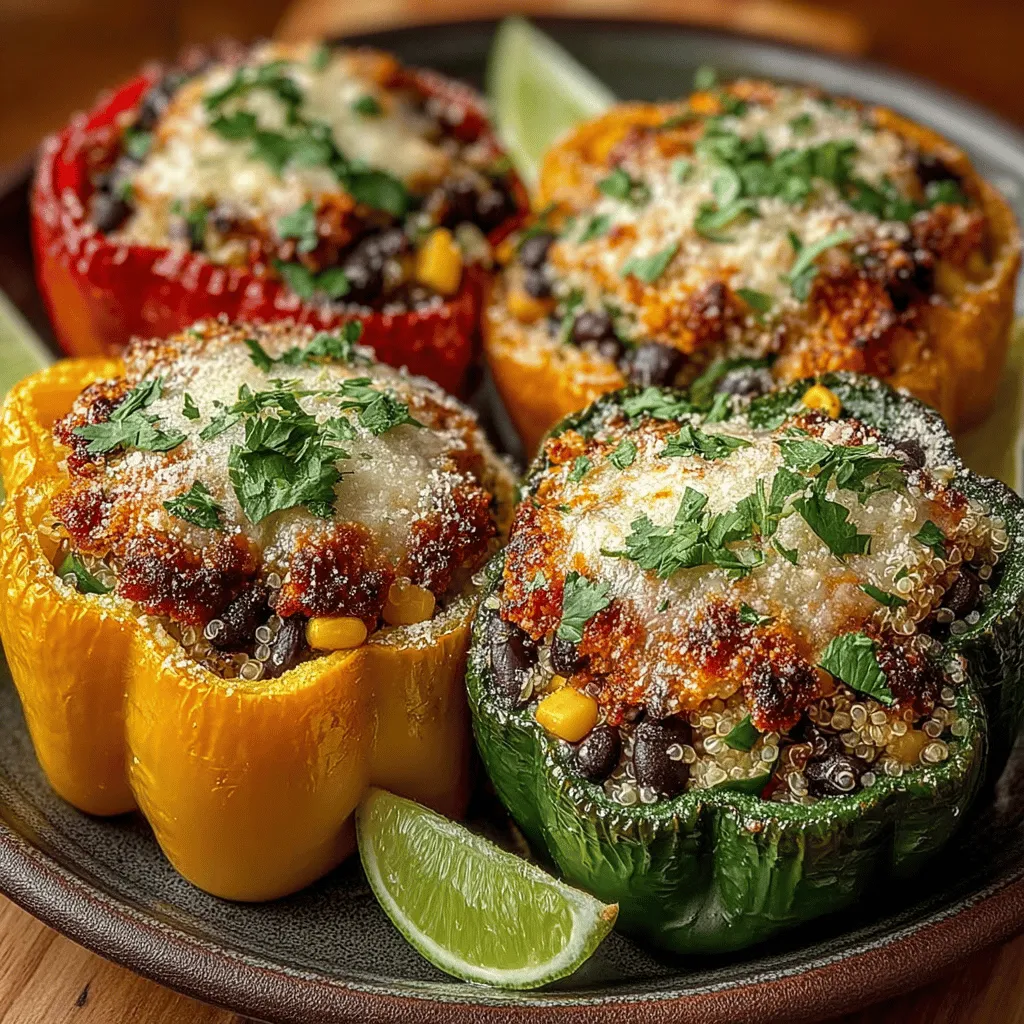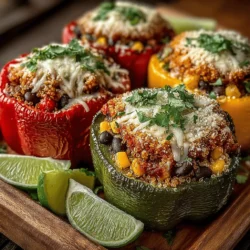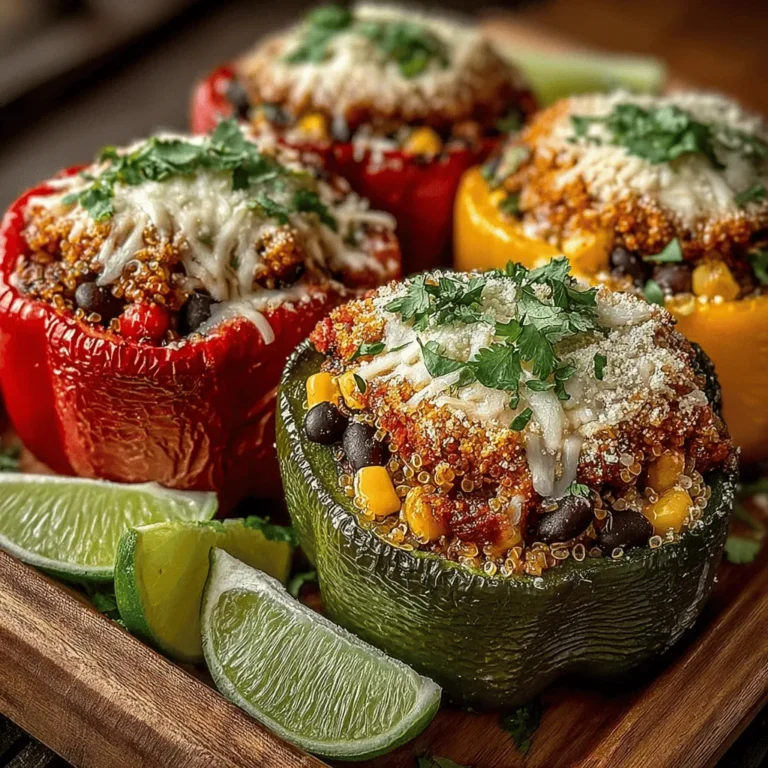Stuffed peppers are a vibrant and wholesome dish that captures the essence of healthy eating. The Colorful Quinoa & Veggie Stuffed Peppers recipe is not only visually appealing but also packed with nutrients, making it an ideal choice for a hearty meal. Whether you’re looking for a vegetarian option or a flavorful dish to impress guests, this recipe provides a perfect balance of taste and health benefits.
Nutritional Benefits of Quinoa and Vegetables
Quinoa, often referred to as a superfood, is a complete protein that contains all nine essential amino acids. It’s also high in fiber, which promotes digestive health and helps maintain a feeling of fullness. When combined with a variety of colorful vegetables, this dish becomes a powerhouse of nutrients. Each ingredient contributes unique vitamins and minerals, making stuffed peppers a balanced meal option.
Bell peppers, the star of this dish, are rich in vitamin C and antioxidants, which can help boost the immune system and protect against chronic diseases. The addition of black beans introduces more protein and fiber, while corn adds a touch of sweetness and crunch. Zucchini and carrots enhance the dish’s nutritional profile, providing vitamins A and C, along with additional fiber. The spices, including cumin, smoked paprika, and oregano, not only elevate the flavor but also offer various health benefits, such as anti-inflammatory properties.
Versatility of Stuffed Peppers
Stuffed peppers are a culinary staple in many cultures around the world. From Italian to Mexican cuisine, the concept of filling a vegetable with a savory mixture is universally loved. This recipe can easily be adapted to suit different dietary preferences or to utilize leftovers from your fridge. Whether you prefer a spicy kick or a more subdued flavor profile, stuffed peppers can accommodate a wide array of tastes.
Understanding the Ingredients
Before diving into the cooking process, it’s essential to familiarize yourself with the key ingredients that make this dish so nutritious and delicious.
Bell Peppers
Bell peppers come in a variety of colors, including red, yellow, green, and orange, each offering unique flavors and nutritional profiles. Red peppers are the sweetest and packed with the most vitamins, while green peppers have a slightly bitter taste. Regardless of the color, all bell peppers are low in calories and high in vitamins A and C.
Quinoa
Quinoa is a gluten-free grain that has gained popularity due to its impressive nutritional content. It is a complete source of protein, making it an excellent choice for vegetarians and vegans. Additionally, quinoa is high in fiber, magnesium, and several other essential nutrients, making it a staple for healthy eating.
Black Beans
Black beans are not only a great source of protein but also rich in antioxidants, which can help combat oxidative stress in the body. They add a creamy texture and earthy flavor to the dish, enhancing both its taste and nutritional value.
Corn
Corn adds a natural sweetness and a delightful crunch to the stuffed peppers. It is also a source of fiber and essential vitamins, such as B vitamins, which are crucial for energy production.
Zucchini and Carrot
Zucchini is a low-calorie vegetable that brings moisture and a mild flavor to the dish. Carrots, on the other hand, add sweetness and a satisfying crunch, along with a wealth of vitamins, particularly vitamin A, which supports eye health.
Spices
The spices used in this recipe—cumin, smoked paprika, and oregano—are vital for building flavor. Cumin adds warmth and earthiness, smoked paprika contributes a subtle smokiness, while oregano enhances the overall taste with its aromatic qualities.
Preparing for the Recipe
To ensure a smooth cooking experience, gather all the necessary kitchen tools and equipment before you begin.
Essential Kitchen Tools
1. Medium saucepan: This will be used to cook the quinoa. Opt for a non-stick saucepan for easy cleanup.
2. Large skillet: A skillet is essential for sautéing the vegetables, allowing them to develop flavor and tenderness.
3. Baking dish: Choose a dish that can accommodate the stuffed peppers comfortably.
4. Parchment paper: For easy cleanup, lining your baking dish with parchment paper is a smart choice.
Step-by-Step Instructions
Now that you’re familiar with the ingredients and tools, it’s time to dive into the preparation process. Follow these clear and concise steps to create your Colorful Quinoa & Veggie Stuffed Peppers.
Preheating the Oven
Start by preheating your oven to 375°F (190°C). This ensures that the peppers will cook evenly and thoroughly.
Cooking the Quinoa
Rinse 1 cup of quinoa under cold water to remove any bitterness. In a medium saucepan, combine the rinsed quinoa with 2 cups of water or vegetable broth for added flavor. Bring the mixture to a boil, then reduce the heat to low, cover, and let it simmer for about 15 minutes. Once the quinoa has absorbed all the liquid, fluff it with a fork and set it aside.
Preparing the Bell Peppers
While the quinoa cooks, prepare the bell peppers. Carefully slice the tops off each pepper and remove the seeds and membranes. Make sure to keep the peppers intact for stuffing. If needed, you can trim the bottom of each pepper slightly to ensure they stand upright in the baking dish.
Sautéing Vegetables
In a large skillet, heat a tablespoon of olive oil over medium heat. Add diced zucchini and carrots, sautéing for about 5 minutes until they begin to soften. Next, incorporate the black beans and corn, cooking for an additional 3-4 minutes. Season the mixture with cumin, smoked paprika, oregano, salt, and pepper, adjusting to your taste preferences.
This initial preparation sets the stage for a delicious and nutritious meal. As you continue with the recipe, you’ll bring together all these elements to create a dish that is as satisfying to eat as it is to behold.

Mixing the Filling: Ensuring Even Distribution of Flavors
To create a delicious and hearty filling for your stuffed peppers, start by mixing your main ingredients in a large bowl. Combine cooked quinoa with black beans, corn, and diced tomatoes, ensuring each component is evenly distributed. This will allow the flavors to meld together as they cook. Add in finely chopped ingredients such as bell peppers, onions, and garlic, which will enhance the texture and taste of the filling.
When mixing, don’t forget to incorporate spices and herbs that elevate the dish. Cumin, paprika, and a pinch of salt and pepper can add depth, while fresh herbs like cilantro or parsley can introduce brightness. Taste the mixture before stuffing the peppers—this way, you can adjust seasoning as needed, ensuring every bite is flavorful.
Stuffing the Peppers: Packing Techniques for a Hearty Filling
Once your filling is ready, it’s time to prepare the peppers. Start by slicing the tops off the bell peppers and removing the seeds and membranes. This not only creates room for the filling but also allows the pepper to soften nicely during baking.
When stuffing, use a spoon to pack the filling tightly into each pepper. This technique ensures that each pepper is filled to the brim, making for a satisfying meal. If you have leftover filling, consider placing it around the peppers in the baking dish for added flavor. For an extra touch, sprinkle some cheese or breadcrumbs on top of the stuffed peppers before baking for a crispy texture.
Baking: Timing and Temperature for Optimal Results
Preheat your oven to 375°F (190°C). Arrange the stuffed peppers upright in a baking dish, ensuring they are snug to prevent tipping. Pour a small amount of vegetable broth or water into the bottom of the dish; this will create steam during baking, helping the peppers to cook evenly and remain moist.
Cover the dish with aluminum foil to trap the steam, which aids in cooking the peppers thoroughly. Bake the stuffed peppers for about 30 minutes covered, then remove the foil and bake for an additional 10-15 minutes, or until the peppers are tender and the tops are slightly golden. This two-step baking process ensures that the peppers are cooked perfectly while allowing the filling to brown slightly on top.
Nutritional Information
Understanding the nutritional breakdown of your meal can help you appreciate its health benefits. A typical serving of colorful quinoa and veggie stuffed peppers contains approximately 300-350 calories, depending on the specific ingredients used. Each serving is packed with protein from quinoa and beans, fiber from vegetables, and healthy carbohydrates.
Benefits of a Plant-Based Meal
This recipe is not only delicious but also offers numerous health benefits. It is rich in vitamins, minerals, and antioxidants, which support overall health. The plant-based ingredients provide essential nutrients without the added saturated fats often found in meat-based dishes. Furthermore, this recipe is suitable for various dietary preferences, making it a versatile option for families or gatherings.
Discussion on Dietary Preferences
These stuffed peppers are a fantastic option for both vegan and vegetarian diets. By using quinoa and beans for protein, this dish can satisfy even the heartiest of eaters while remaining entirely plant-based. If you’re cooking for someone who prefers a vegetarian diet, consider adding cheese to the filling or as a topping, which can enhance flavor while still keeping it meat-free.
Flavor Profiles and Variations
Suggestions for Ingredient Substitutions
Feel free to get creative with your stuffed peppers! Here are some ideas for ingredient substitutions that can modify the flavor profile:
– Different Grains Instead of Quinoa: If you prefer a different grain, brown rice, farro, or even couscous can be excellent alternatives. Each grain brings its unique texture and flavor to the dish.
– Alternative Beans and Vegetables: Swap black beans for kidney beans, chickpeas, or lentils for a different taste. You can also experiment with various vegetables, such as zucchini, mushrooms, or spinach, to add more nutrients and flavors.
– Cheese Options for Different Dietary Needs: If you’re making this dish for vegans, consider using nutritional yeast for a cheesy flavor without dairy. For vegetarians, shredded cheese like Monterey Jack or mozzarella works beautifully. If you want to keep it dairy-free, try almond or cashew cheese.
Flavor Enhancements: Adding Herbs or Spicy Elements
Enhance the flavor of your filling by incorporating fresh herbs like basil, oregano, or thyme. For a bit of heat, consider adding diced jalapeños or a pinch of cayenne pepper. These additions can elevate the dish and cater to various taste preferences, ensuring there’s something for everyone.
Serving Suggestions
Ideas for Side Dishes that Complement Stuffed Peppers
To create a well-rounded meal, consider serving your stuffed peppers with a side salad dressed in a light vinaigrette. A crisp cucumber and tomato salad or a refreshing coleslaw can balance the hearty flavors of the stuffed peppers. For something warm, a side of roasted vegetables or garlic bread pairs wonderfully.
Pairing with Beverages: What to Drink with the Meal
When it comes to beverages, a light white wine, such as Sauvignon Blanc, complements the fresh flavors of the dish. Alternatively, iced herbal tea or sparkling water with a hint of lemon can provide a refreshing contrast to the richness of the stuffed peppers.
Presentation Tips for a Beautiful Table Setting
For an appealing presentation, serve the stuffed peppers on a vibrant platter, garnished with fresh herbs. Use colorful dishes to enhance the visual appeal of the meal. Consider placing a small amount of the leftover filling around the peppers on the platter for added color and texture.
Storing and Reheating Tips
Best Practices for Storing Leftovers
If you have any leftover stuffed peppers, store them in an airtight container in the refrigerator. They can typically last for up to 3-4 days. For longer storage, consider freezing them. Wrap individual peppers in plastic wrap and place them in a freezer-safe bag, ensuring to remove as much air as possible.
How to Reheat Stuffed Peppers Without Losing Flavor or Texture
To reheat stuffed peppers, place them in a baking dish and cover with foil to prevent drying out. Bake at 350°F (175°C) for about 20-25 minutes or until heated through. For a quicker option, you can microwave them on a microwave-safe plate for about 2-3 minutes, but be aware that this may result in a softer texture.
Tips for Freezing the Dish for Future Meals
To freeze stuffed peppers effectively, ensure they are fully cooked and cooled before wrapping. Label the bags with the date and type of filling to keep track of your meals. When you’re ready to enjoy them, thaw in the refrigerator overnight before reheating.
Conclusion
In summary, colorful quinoa and veggie stuffed peppers are not only a feast for the eyes but also a wholesome, nutritious meal packed with flavor. This recipe is perfect for those seeking a healthy plant-based option that can easily be customized to suit various tastes and dietary preferences.
Don’t hesitate to experiment with different fillings and toppings—cooking is a creative activity that invites experimentation. Embrace the process, and enjoy the satisfaction of creating a delicious and healthy meal for yourself and your loved ones. With every stuffed pepper you make, you’ll discover new flavor combinations and techniques, making your culinary journey even more rewarding.


